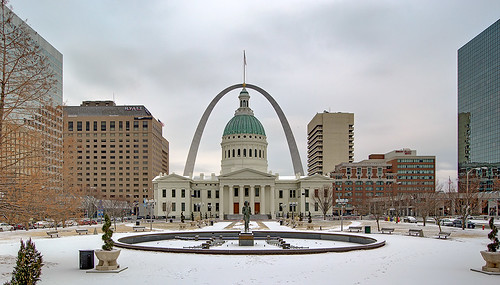
The Old Courthouse is at the center of downtown, and faces Kiener Plaza, in the foreground, and the Gateway Mall, behind the camera. Along the same axis is the Gateway Arch, in the background.
From the National Park Service website:
The original courthouse was constructed of brick in the Federal style of architecture and completed in 1828. The population of St. Louis grew three fold during this period due to the booming fur trade, and the courthouse was outgrown ten years after it opened. A second courthouse was designed by architect Henry Singleton, which incorporated the original courthouse as the east wing of the building.
The second courthouse was designed with four wings and a dome in the center of its axis. The cornerstone was laid in 1839 and within it were placed newspapers of various cities, an assortment of coins, and names of officers of government. Three tiers of balconies or galleries viewed the rotunda floor. Pillars of stone supported the first gallery, while white oak columns supported the upper two galleries. There were offices and courtrooms located throughout the building. The maximum number of courtrooms in use at one time was twelve, although fifteen different rooms were used over the duration of the courthouse's operations.
The Old Courthouse underwent a second period of construction beginning in 1851. The original brick courthouse was demolished and replaced with a new east wing. Between 1855 and 1858 the west wing was remodeled due to unsound second floor construction. The lower floor was divided into a hallway and two courtrooms to support the floor above. The Dred Scott trial occurred in the original lower west courtroom before it was remodeled.
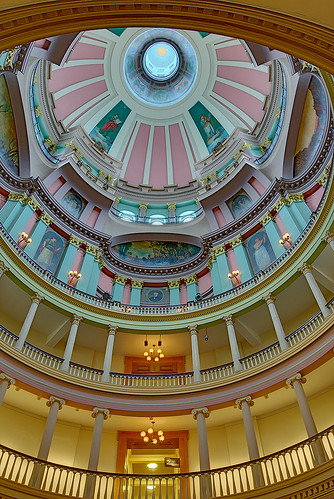
A view up into the dome.
Continuing from the NPS history:
Due to the extensive remodeling, the original dome, a classic revival style, was replaced. The new dome was of wrought and cast iron with a copper exterior in an Italian Renaissance style. In 1861, the Federal government was constructing a similarly styled dome for the Capitol Building in Washington, D.C. Both domes were modeled after the dome in St. Peter's Basilica in Rome. Controversy was sparked when naysayers assumed the dome in St. Louis would be too heavy to be supported. The architect of the dome, William Rumbold, constructed a test model dome and proved it was sound. Once the dome was complete, Carl Wimar was commissioned to paint murals, in eye-shaped openings called "lunettes," on the interior of the dome. The subjects of the lunettes were four significant benchmarks in St. Louis history. A redecoration of Wimar's work occurred in 1880 by Ettore Miragoli with his own paintings. In 1888 August Becker restored the original Wimar paintings. Moisture and decay occurred over the years, and in 1905 and 1921 two more restorations were made.
The Old Courthouse was abandoned by the City of St. Louis in 1930 because the growth of the city required additional court space and a new structure had been completed a few blocks to the west. During the following ten years the older building was used for an art school and a workshop for a religious organization that refurbished toys for needy children. It also served as offices for two justices of the peace and their constables.
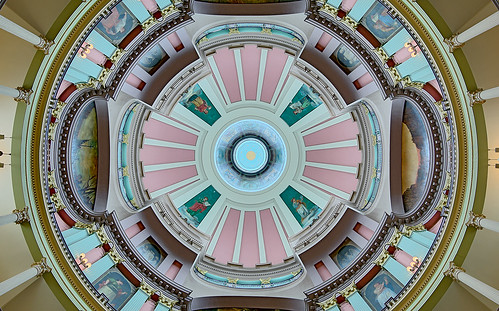
A dizzying view looking straight up. The dome has two layers; the interior is seen here, with a space above for maintenance of the exterior dome.
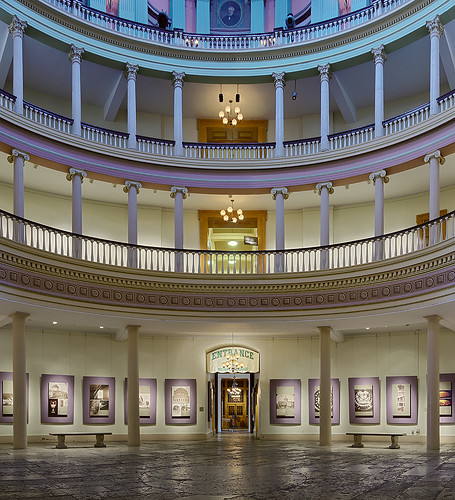
The limestone floor of the rotunda is worn smooth after over a century of use. The acoustics here are excellent; in the days before electronic sound amplification, public speakers could address large numbers of people on the floor and the three balconies. The Roman Emperor Constantine built a number of round churches of this layout, and we also find lecture halls of similar design in the ancient universities of Europe. Best acoustics are found if the speaker is off to one side.
Our word ‘rotunda’ comes from the Italian, rotonda camera, ‘round chamber’
The building houses a number of museum exhibits. Here is a diorama of colonial life in Sainte Genevieve, Missouri. Many buildings of this type from the colonial period still exist in that town, which is located about 64 highway miles south of the Old Courthouse.
Another view of the rotunda.
This building incorporates a significant amount of natural lighting; this hallway is illumined by a large skylight above. And like many buildings of the period, ceilings are high, which helps keep rooms somewhat cooler in the summertime.
The Dred Scott courtroom no longer exists. Dred Scott was a slave who sued for his freedom from bondage; his case eventually led to the United States Supreme Court, which ruled that African slaves were not persons, had no standing in court, and were not eligible for citizenship. This was one of the events which led to the American Civil War. Click here for some of my old photos of the courthouse and commentary of the Dred Scott case.
Stairs leading up into the dome. Another skylight is above, and an opening in the floor, seen here, directs daylight below.

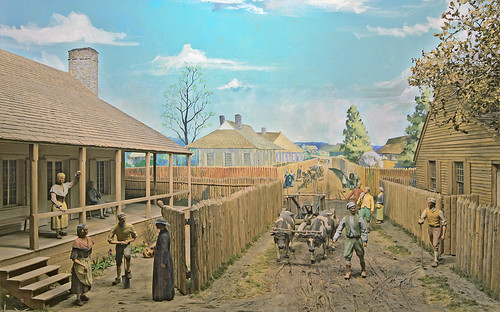
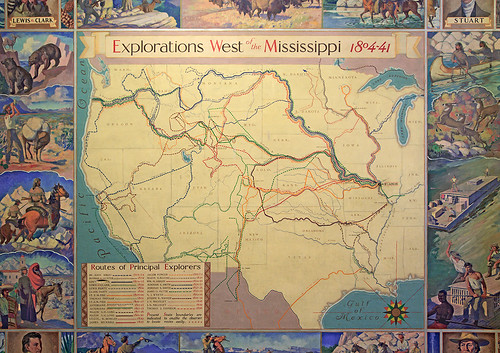
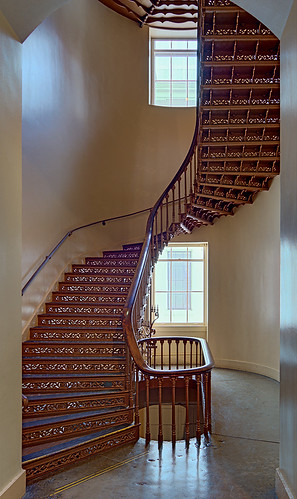
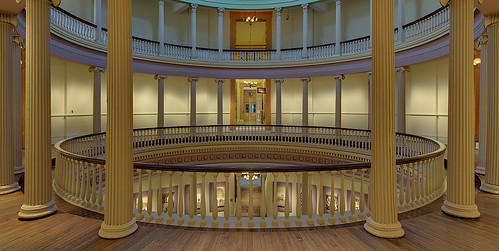
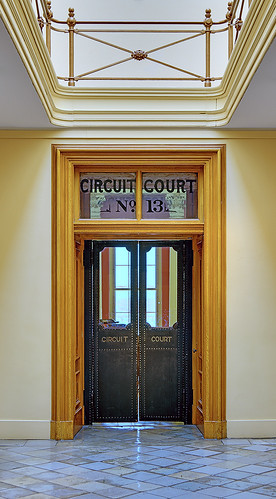
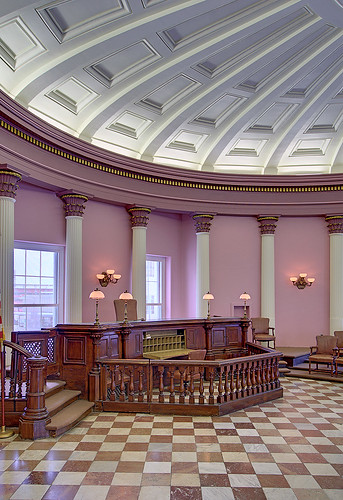
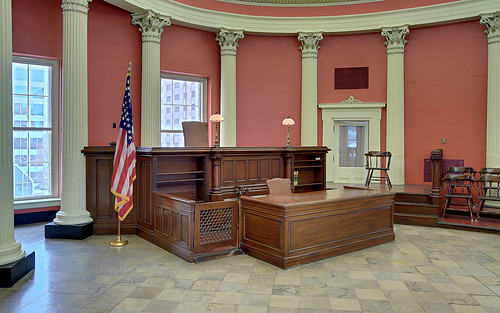
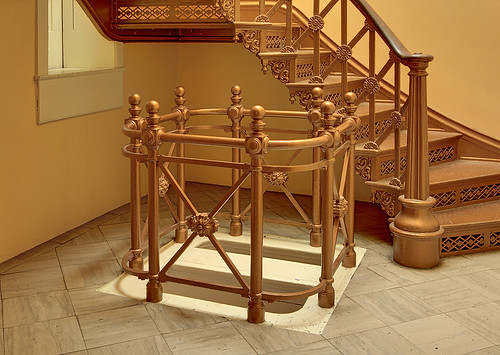
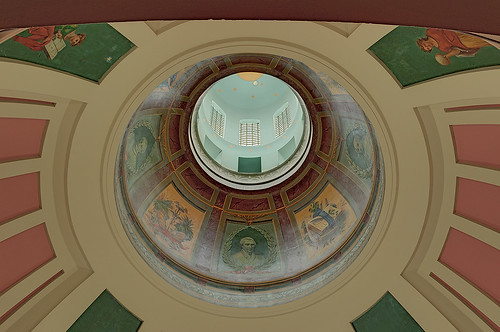
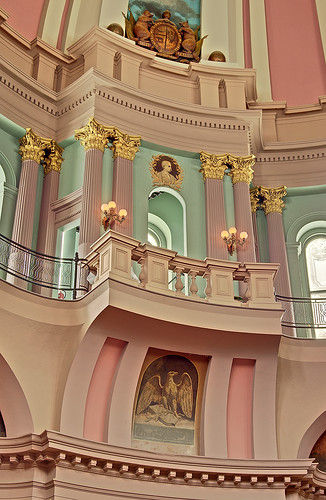
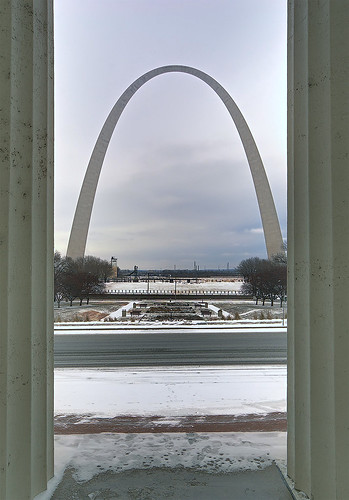

Outstanding!
ReplyDelete